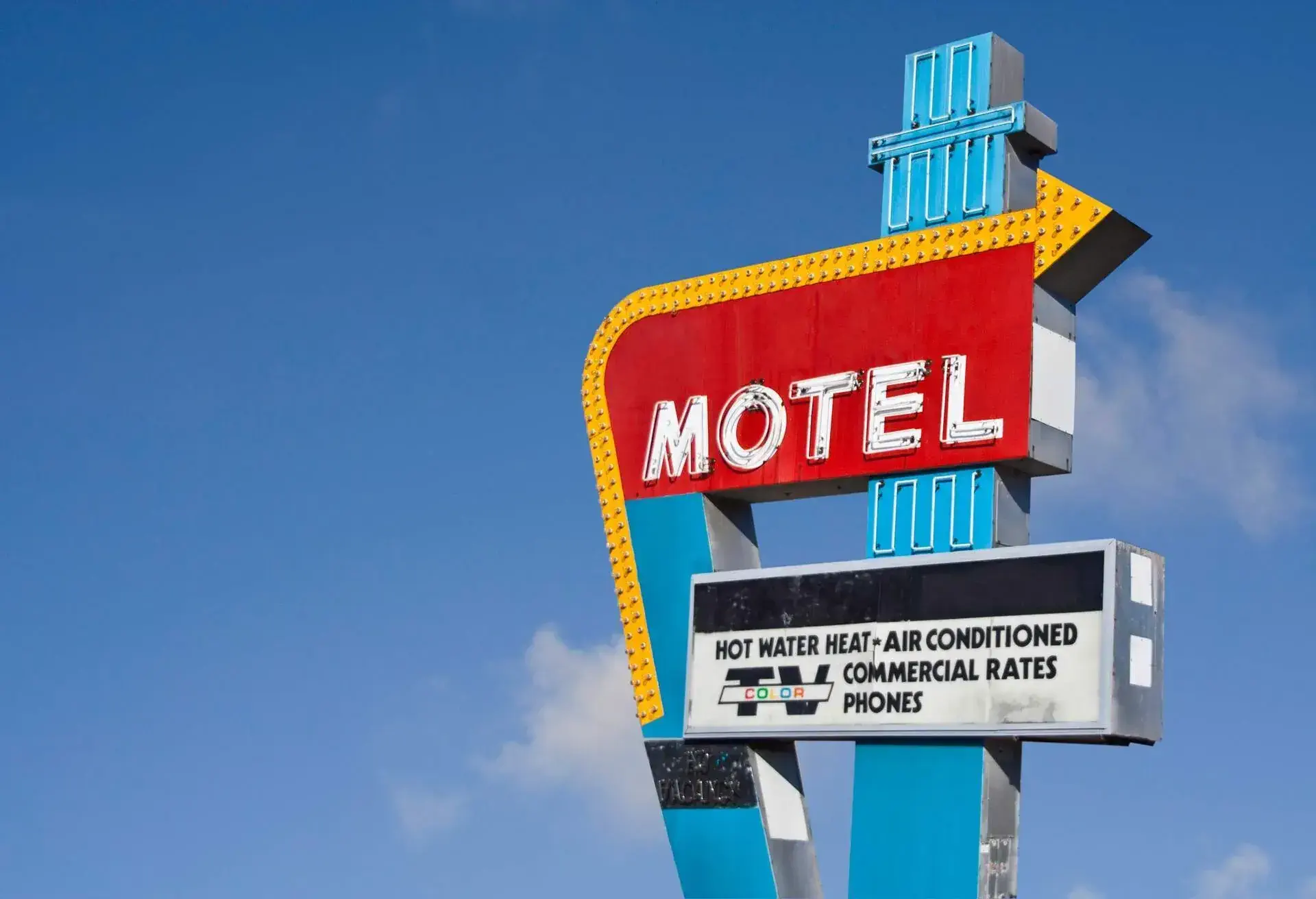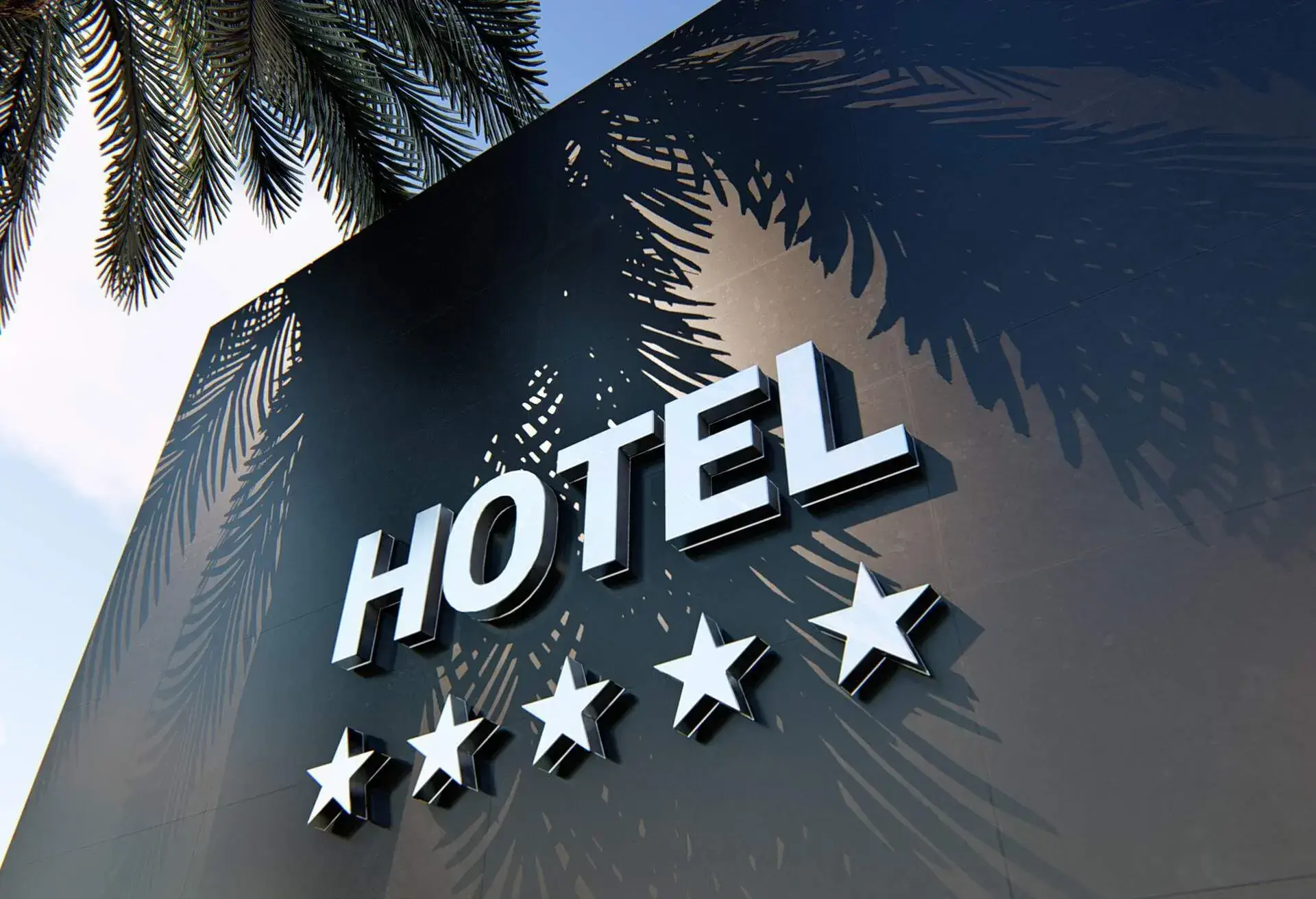Whenever I travel, which is often, I want to choose lodgings that reflect the type of experience I want to have. Booking the best place to stay goes beyond considering price and location, although those are important factors. Rather, when it comes to a motel vs. hotel, it’s all about defining the purpose of my trip.
For instance, when I road-tripped from Austin to Seattle last year — with my dogs and backpacking gear in tow — I opted to stay at roadside motels or cheaper pet-friendly hotels rather than posh hotels because this was a more convenient, affordable option.
On the other hand, when I travelled to Mexico City a few months ago, I craved an upscale boutique hotel. I knew I’d be spending time at my hotel (hanging out in between sightseeing), so I wanted to stay somewhere comfy with plenty of amenities.
Knowing what a motel is (compared to a hotel) is crucial when you’re deciding where to stay as is considering the type of trip you’re taking. Keep reading for everything you need to know about motels and hotels, so you can find the perfect accommodation and enjoy your trip.
What is a motel?

Motels have their origins in the 1920s and 1930s when the automobile was popularised in the US. During this time, people began travelling across the country and needed places to stay along the way.
They tend to be located close to roads and highways, outside of urban areas. In general, they are plain and functional, with little to no bells and whistles. They’re usually single-story structures and are designed for short, quick stays.
Another common difference between a motel and a hotel is that motel room doors lead you directly to the outdoors, for easy car access. In a hotel your room will likely be located in an internal corridor. Because motels offer fewer guest comforts and amenities than hotels, they’re almost always the more affordable option between the two.
One of the things I love most about staying at a motel is that you usually don’t have to make reservations in advance like you would at a hotel. You just show up and secure a room. For example, when I took a West Coast family road trip, I knew I only needed a place to sleep and recharge, in which case, a motel was the best option.
What is a hotel?

For example, in Mexico City, I wanted to stay somewhere I would be happy to spend a lot of my time, somewhere with contemporary amenities and cool, historic details. My boutique hotel with a deep bath in the room and delicious complimentary breakfast (all the chilaquiles I could eat) did the trick nicely.
It’s important to note here that nearly all hotels are categorised according to the five-star system. At the low end of the spectrum, a 1-star hotel only provides the bare necessities, like a bed and bathroom. At the high end of the spectrum, a 5-star hotel provides a plethora of on-site amenities. These could include concierge services, spas with licensed masseuses, state-of-the-art gyms, valet parking and more.
4-star and 5-star hotels also have more personalised staff attention than lower-rated hotels. These hotels focus on catering the experience to every guest, with customised menus, unique packages and other personalised amenities. Staff are also prepared to accommodate special requests.
Finally, you can expect the in-room furnishings and bedding to be of higher quality at 4- and 5-star hotels than at 1- and 2-star hotels.
Motel vs hotel: quick overview
| Motels | Hotels |
|---|---|
| Popular in the US, not common in the UK | Found worldwide |
| Located close to roads and highways | Located in cities or towns or near major attractions, airports, and other sites of interest. |
| Plain, functional furnishings | Considered furnishings |
| Usually, a single story structure | Usually, multiple stories |
| Basic amenities like a TV and parking | Varied amenities, from a pool & spa to on-site restaurants and childcare |
| Cheap rates | Varied rates – more expensive than a motel |
| Often used for short stays by road trippers or budget-conscious travellers | Often used for longer stays by families, business travellers, solo travellers or anyone looking for more comfort |
Motel vs hotel: the differences in detail
Location
Location is another big difference between the two. Hotels are typically located in cities or towns and near major attractions, airports, and other sites of interest. Motels are dotted along roads and US motorways, away from cities.
Amenities
Because they offer various amenities, hotels are usually more expensive than motels. These amenities can include everything from restaurants to a gym to a spa/swimming pool area, just to name a few. Motels, on the other hand, generally only have the most basic in-room amenities, like bedding, towels, toiletries and a TV. Some may have a pool and/or continental breakfast room on the premises, but few have services that extend beyond this.
When it comes to amenities, everyone has different values and preferences. Some travellers may not require on-site amenities at all, while others want to have everything from a full-service spa to gourmet restaurants at their fingertips. For me, if I’m considering which type of lodgings to book, I’ll often go with a hotel that has a nice swimming pool and room service. I love being able to wake up in the morning to swim laps and end my day with dinner and a glass of wine (best enjoyed with a side of bad reality TV, of course).
Size
Size is another primary difference between a motel and a hotel. A motel is usually a low-slung structure with just one or two floors and relatively few rooms. By contrast, a hotel is generally a larger building with multiple stories, a lobby, and often hundreds of rooms.
Target audience and length of stay

In terms of motel vs hotel, the two types of lodgings tend to attract different people. Since motels are mostly located on motorways, they tend to attract more transient travellers as opposed to those seeking an experience.
Motels are usually the cheapest form of lodging because they don’t offer ‘extras’, so their target audience primarily consists of budget-conscious travellers. Motels are also designed for short-term stays (for people on road trips as opposed to week-long holidays).
Hotels attract a diverse range of guests, many of whom value comfort. Travellers who opt to book a hotel over a motel may want to take advantage of on-property amenities, like a spa, gym, or room service. Hotels are also often found near popular attractions and airports, so travellers who value being in a convenient location seek out hotels.
Business travellers also tend to opt for hotels as they have fast WiFi and many (especially those that have 3-stars or more) will have business centres.
How much is a motel vs a hotel?
In general, motels are substantially cheaper than hotels.
Hotels can be affordable or expensive, depending on the level of accommodations and amenities offered. Location is a major factor in pricing, too.
You can expect to pay more for a city centre hotel in London than you would for one located outside the city, for example. Timing again can have an impact, for example, if you want to stay during a major event like a concert or marathon.
Motel FAQs
Yes, motels are generally cheaper than hotels. Motels have fewer amenities than hotels do (or often none at all) and they tend to be located in rural areas, where the cost of living is more affordable. Motels are also cheaper because they don’t require as many employees as hotels.
It really depends on the motel and where it’s located. If safety is a concern, consider picking a place with a few key features. Your room should be equipped with a deadbolt lock and peephole, the phone should allow outside dialling and the interior and grounds should be well-lit.
They are much less common than the US, but motels do exist in the UK. The Redbeck would be a classic example, with doors opening out onto the drive where you can park your car. That said, B&BS and chain hotels are a lot more common.
If a motel offers amenities and services, this generally qualifies it as a hotel. Examples of this could be a concierge, valet parking, a spa, a swimming pool, on-site restaurants or other food options, and a fitness centre. In addition, hotels are usually multi-storey buildings, whereas motels consist of one or two storeys.
Motel rooms are typically accessed from the car park, while hotels have a lobby area and interior hallways. Motels generally employ fewer (and less specialised) staff members. Another major difference between the two is the quality of the bedding and furnishings. Hotels have higher-quality linens, beds, and furniture than most motels.







